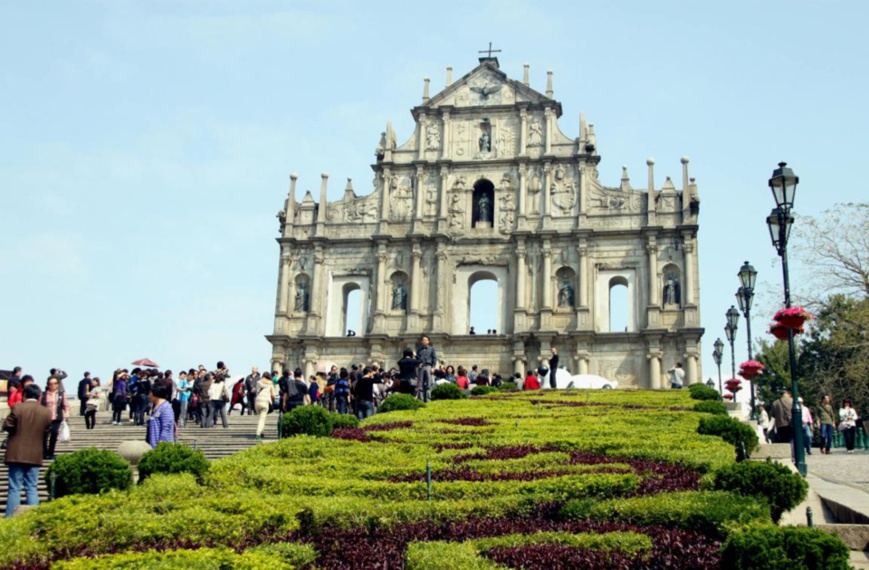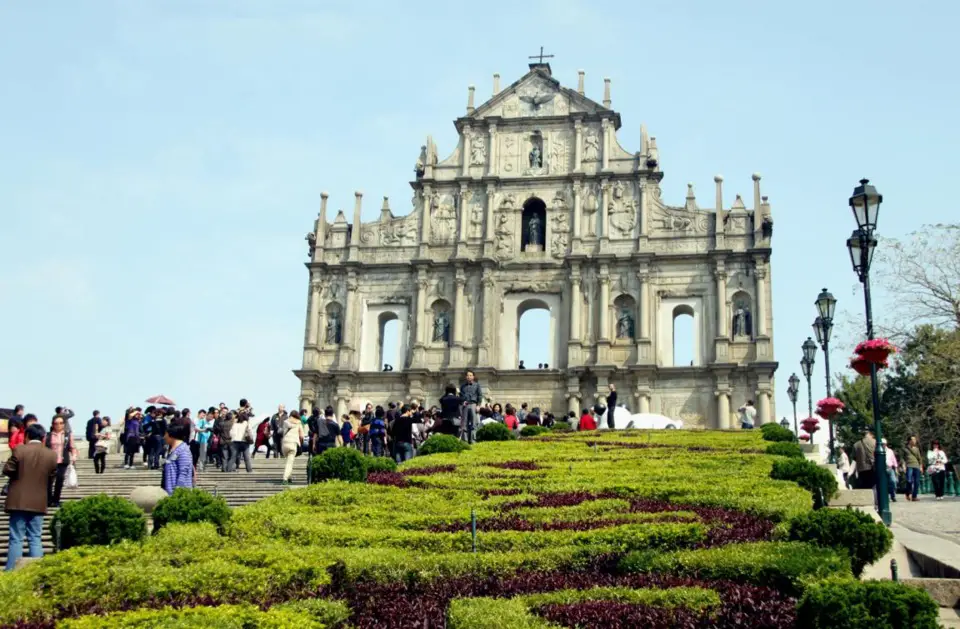By Wen Hongyan, Mao Lei, Wang Yao, People’s Daily

Tourists go sightseeing at the Ruins of St. Paul's, a world cultural heritage site in Macao. (Photo by Zhou Songlin)
Macao, over the past 20 years since its returning to China, has embraced better development and become more beautiful. Its people have also experienced increased sense of happiness and gain.
“It’s not a secret that Macao citizens, especially senior citizens, enjoy great social welfare. That’s why people say ‘it is a blessing to grow old in Macao’,” said Pou Sam Chan, member of Consultative Committee on Municipal Affairs, Municipal Affairs Bureau (IAM).
During the first half of the past 20 years, Macao focused on economic development. Then it spent the second half improving people’s livelihood.
From 1999 to 2018, the region had managed to achieve leapfrog development and become one of the world’s frontrunners regarding per capita GDP. During this period, its GDP had increased from 51.9 billion patacas (about $6.46 billion) to 444.7 billion patacas, while its per capita GDP jumped from 120,000 patacas to 670,000 patacas.
The continuous economic growth and sufficient fiscal revenue allowed the government of the Special Administrative Region (SAR) to largely raise its expenditure on people’s livelihood. That’s how the current social and political stability of the region is secured.
“I have witnessed and taken part in the construction and development of Macao,” said Paulina, a 40-year-old Macao citizen who studied at Macao Institute for Tourism Studies 20 years ago.
“I was born in Macao. My mother is Portuguese, and my father’s origin is in Guangdong province. He told me and my two sisters that we are Chinese since we were little,” said Paulina.
When she first stepped in the convention and exhibition industry, Paulina mostly organized meetings of around 50 people, and all she needed were a conference room and a microphone, she introduced, adding that now the largest event organized by her company involved more than 21,000 participants.
Official statistics showed that more than 333,000 people visited Macao SAR for conferences and exhibitions in the first quarter of this year, up 15 percent from a year ago.
Today, the convention and exhibition industry has become an integral part of the diversified development of Macao.
“Children in Macao don’t need to pay for schooling, though they still need to pay a little tuition for extra-curricular classes,” said Cheong Wai Kam, a mother of a 7-year-old.
In 2007, Macao SAR started 15-year free compulsory education covering kindergarten, primary and secondary education. The region’s primary health care system has been rated as a role model for the Pacific region. The average life expectancy of Macao citizens has reached 84 years.
Besides, the Macao SAR government has built 51,000 houses for middle- and low-income citizens. Macao has turned its dream into reality that every child has access to education, every patient receives treatment, every senior citizen is taken care of, every resident has a home, and every disabled person is respected.
The Hengqin campus of the University of Macau (UM), which is half an hour’s drive away from downtown Macao, is a well-equipped university with tranquil environment. Its facilities, such as the library, are open to the public.
“UM is one of the best universities on the west coast of the Guangdong-Hong Kong-Macao Greater Bay Area. We will leverage the institutional strength and internationalization of the Macao SAR to make greater efforts to attract high-level talents from the world to Macao and the area, so as to drive forward and promote the comprehensive development of the area,” said Song Yonghua, rector of University of Macau.
As “one country, two systems” policy provides institutional advantages and policy guarantee for the sustainable development of Macao, both the SAR government and the Macao residents believe that the region should actively integrate itself into the national development of the country and take part in the joint construction of the Belt and Road Initiative (BRI), as well as respond to the needs of the motherland while giving full play to Macao’s strengths.
“Macao has a clear understanding of its role. It is a world-class tourism and leisure centre, a commerce and trade cooperation service platform between China and Lusophone countries, and a base for exchange and cooperation where Chinese culture is the mainstream and diverse cultures coexist.
Among all the 11 cities of the Guangdong-Hong Kong-Macao Greater Bay Area, Macao is the one who enjoys the most profound history and tradition of cultural exchanges between China and Western countries,” said Ho lat Seng, the fifth chief executive of the Macao SAR.
“Other cities cannot replace the role of Macao,” said Ho, adding that Macao is able to gradually turn cultural exchanges into industries.
Macao is a place where the passionate Macau Grand Prix and the traditional lifestyles of the A-Ma Temple perfectly co-exist. It mixes ancient styles with modernity and hurly-burly with tranquility. It’s where diversified cultures merge and spark with new ideas.
Although it is a small city, Macao is full of potential and vitality. By marching forward with the country, Macao is bound to achieve greater success with its practice of the “one country, two systems” principle.
“It’s not a secret that Macao citizens, especially senior citizens, enjoy great social welfare. That’s why people say ‘it is a blessing to grow old in Macao’,” said Pou Sam Chan, member of Consultative Committee on Municipal Affairs, Municipal Affairs Bureau (IAM).
During the first half of the past 20 years, Macao focused on economic development. Then it spent the second half improving people’s livelihood.
From 1999 to 2018, the region had managed to achieve leapfrog development and become one of the world’s frontrunners regarding per capita GDP. During this period, its GDP had increased from 51.9 billion patacas (about $6.46 billion) to 444.7 billion patacas, while its per capita GDP jumped from 120,000 patacas to 670,000 patacas.
The continuous economic growth and sufficient fiscal revenue allowed the government of the Special Administrative Region (SAR) to largely raise its expenditure on people’s livelihood. That’s how the current social and political stability of the region is secured.
“I have witnessed and taken part in the construction and development of Macao,” said Paulina, a 40-year-old Macao citizen who studied at Macao Institute for Tourism Studies 20 years ago.
“I was born in Macao. My mother is Portuguese, and my father’s origin is in Guangdong province. He told me and my two sisters that we are Chinese since we were little,” said Paulina.
When she first stepped in the convention and exhibition industry, Paulina mostly organized meetings of around 50 people, and all she needed were a conference room and a microphone, she introduced, adding that now the largest event organized by her company involved more than 21,000 participants.
Official statistics showed that more than 333,000 people visited Macao SAR for conferences and exhibitions in the first quarter of this year, up 15 percent from a year ago.
Today, the convention and exhibition industry has become an integral part of the diversified development of Macao.
“Children in Macao don’t need to pay for schooling, though they still need to pay a little tuition for extra-curricular classes,” said Cheong Wai Kam, a mother of a 7-year-old.
In 2007, Macao SAR started 15-year free compulsory education covering kindergarten, primary and secondary education. The region’s primary health care system has been rated as a role model for the Pacific region. The average life expectancy of Macao citizens has reached 84 years.
Besides, the Macao SAR government has built 51,000 houses for middle- and low-income citizens. Macao has turned its dream into reality that every child has access to education, every patient receives treatment, every senior citizen is taken care of, every resident has a home, and every disabled person is respected.
The Hengqin campus of the University of Macau (UM), which is half an hour’s drive away from downtown Macao, is a well-equipped university with tranquil environment. Its facilities, such as the library, are open to the public.
“UM is one of the best universities on the west coast of the Guangdong-Hong Kong-Macao Greater Bay Area. We will leverage the institutional strength and internationalization of the Macao SAR to make greater efforts to attract high-level talents from the world to Macao and the area, so as to drive forward and promote the comprehensive development of the area,” said Song Yonghua, rector of University of Macau.
As “one country, two systems” policy provides institutional advantages and policy guarantee for the sustainable development of Macao, both the SAR government and the Macao residents believe that the region should actively integrate itself into the national development of the country and take part in the joint construction of the Belt and Road Initiative (BRI), as well as respond to the needs of the motherland while giving full play to Macao’s strengths.
“Macao has a clear understanding of its role. It is a world-class tourism and leisure centre, a commerce and trade cooperation service platform between China and Lusophone countries, and a base for exchange and cooperation where Chinese culture is the mainstream and diverse cultures coexist.
Among all the 11 cities of the Guangdong-Hong Kong-Macao Greater Bay Area, Macao is the one who enjoys the most profound history and tradition of cultural exchanges between China and Western countries,” said Ho lat Seng, the fifth chief executive of the Macao SAR.
“Other cities cannot replace the role of Macao,” said Ho, adding that Macao is able to gradually turn cultural exchanges into industries.
Macao is a place where the passionate Macau Grand Prix and the traditional lifestyles of the A-Ma Temple perfectly co-exist. It mixes ancient styles with modernity and hurly-burly with tranquility. It’s where diversified cultures merge and spark with new ideas.
Although it is a small city, Macao is full of potential and vitality. By marching forward with the country, Macao is bound to achieve greater success with its practice of the “one country, two systems” principle.
 Menu
Menu
 Macao to embrace brighter future with diversified development
Macao to embrace brighter future with diversified development
















